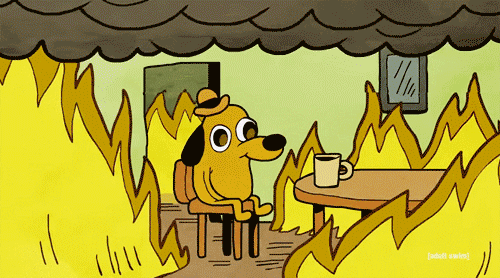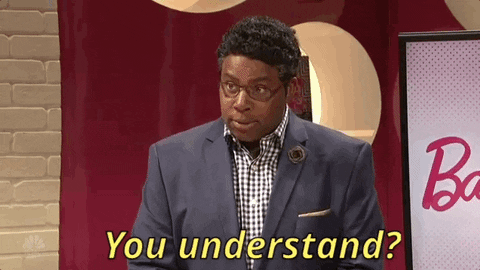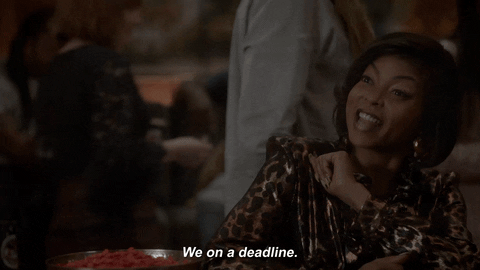Have you ever wished a huge warning sign flashed in front of your eyes before registering for a certain class? Unfortunately, life doesn’t work that way. I came to this realization after registering for the dreaded “Public Relations Research and Strategies” at Florida A&M University (FAMU). Every Public Relations (PR) major at Florida A&M needed to take this class as a degree requirement. Although a mixture of headaches and daily all-nighters, the class also provided me with some of the biggest lessons I’ve learned in higher education. Not only did I learn about research and how to properly conduct it but I learned how to focus and organize my thoughts to effectively complete assignments in this class. Don’t fret if you happen to be a wide-eyed freshman reading this article in hopes of finding some kind of light at the end of the tunnel.
Keep reading for tips on how I survived this whirlwind of a PR class.
1. Do Not Underestimate the Course Load

Only one professor instructs this class at FAMU: Dr. Bettye Grable. From the start, Dr. Grable emphasizes that if you don’t make time to thoroughly conduct the proper research, the class will propose an impossible task. And let me tell you… she did not tell one lie when saying this. Before passing this class with flying colors, I enrolled the semester before but unfortunately, I had to drop it due to the course load.
Now in no way am I trying to discredit the importance of this class because this class served great importance to my development as a writer as well as improving my ability as a researcher. “Staying focused and learning how to conduct research was the most challenging for me. I spent hours upon hours finding the necessary articles for the term paper, so I had to become disciplined when it came to being dedicated,” FAMU senior Johnathan Edouard said. The course work has many deadlines, including a paper that must be turned in at the end of the semester. After withdrawing from the class and re-enrolling the following semester, I knew prior to retaking the class what Dr. Grable expected of me as a student. Meet the weekly deadlines, turn in those scholarly sources and brace yourself for a content heavy course.
2. Procrastination Will Be Your Downfall

If you expect to pass this or any research class for that matter here lies a harsh truth you must understand: procrastinating is your absolute worst enemy. As a student in this class, you’ll take on the task of writing a 20-page research paper on the topic of Dr. Grable’s choice. Previous topics include “Violence in Underprivileged Neighborhoods and “The Effects of Visual Culture.” The topic varies each semester depending on what she chooses and won’t always be the easiest topic.
The rubric for this paper also states that you MUST use and reference 25 scholarly articles from any approved databases provided by the universities website so that in itself will already stretch you beyond belief. “Put more time aside for this class than you usually would for any other class. This class is no joke and requires a quite a bit more focus than usual because you are required to look over an array of articles and books that in the beginning looked like gibberish to me,” FAMU senior Sydney Jasper said. Your chances of passing just by doing the bare minimum prove slim to none so buckle down and get ready to dominate!
3. The Teacher’s Pet Always Passes

Okay, so you showed up to class? So what! If you expect to learn anything, put the phone down, stop scrolling through amazon and listen. Not only would I advise listening but becoming the teacher’s pet might just give you a great advantage. After all, have you ever noticed that the most engaged student in the class usually receives the highest grade? Try volunteering to stand up in front of the class and present a few of the articles you found while searching the web or you can take the initiative to start a class google document that the professor will later review. Even if you seem to be struggling throughout the entire semester, if you show interest in the lesson plan you will most certainly pass.
4. Don’t Be a Negative Nancy

Dr. Grable requires the utmost effort from her students. On gloomy days you might not feel in the mood to deal with the amount of effort you have to put into this class but always remember that keeping a positive outlook will benefit your grades in the long run. No one hates a negative Nancy more than Dr. Grable and she will make this known. In fact, showing off a positive attitude regardless of external factors will boost not only your own morale but that of your fellow classmates.
The best times in class included the ones where we allowed ourselves to crack jokes about Trump’s latest’s Twitter rant or how not a soul in the class could figure out how to operate the projector. Crack a smile once in a while and maybe, just maybe, you’ll see the results in your work ethic and later, your grades.
5. Staying Organized Can Make All the Difference

PR Research and Strategies means nothing if you neglect to make organization your priority. Seeing that you will be writing a 20-page research paper this can definitely feel challenging. Completing a research paper, in general, is already proposes a difficult task but when it’s 20 pages worth you may not know where to start. In my case, I immediately thought to myself: what can I even talk about that’s worth 20 pages?
Step 1: figuring out how to stay organized! Make sure to print out and keep a folder for all the articles that you find because as a part of the final grade you also must submit the articles cited. “Components of this class had to be constructed a certain way, so it was very important to pay attention to detail and constantly keep your materials together or you will most certainly fall short,” FAMU senior Crichanni Watson said. When in doubt, pull out that folder and organize all your worries into it!
6. Apply What You Have Learned

At first, it will seem hard to understand what the absolute heck you are learning but eventually, you’ll find you can connect the dots. Don’t let giving up become an option, because Dr. Grable’s lessons will most likely expand as valuable lessons in the real world. This class showed me the importance of “active listening.” Dr. Grable provides her classes with a plethora of lessons but this jumped out to me as the most important one because I noticed I am definitely not an active listener.
As students, we often believe we listen to our professors but in reality that’s not always the case. Active listening means eliminating all outside distractions and giving it your all to truly understand what the person in front of you is saying. When you master this skill you’ll find that conversations flow easier and you understand lessons a lot easier as well. So during the class and even when it comes to an end, find ways to hold onto these valuable lessons by applying them in your own life.
7. Office Hours Make a Huge Difference

Didn’t make it to class? Office hours. Can’t seem to grasp yesterday’s lesson on how to write a literature review? Office hours. Attending office hours in this class can save a life. As I said before, this class can become a little overwhelming but that’s nothing a little one on one time with Dr. Grable can’t fix. Going to the designated office hours means you get to sit down one on one with the professor and not only analyze what you can improve on but have the chance to get praised for all your hard work. And when I say go to office hours I don’t mean just go the one time you have a question, but continuously going builds a great relationship between you and the professor that will benefit you for time to come.
8. Meet Deadlines or Die

If you think you can finesse deadlines in this class, good luck Charlie. Professor Grable just won’t tolerate late work, and it could only result in a zero. Because you technically only have one assignment the possibility of you becoming lazy will be at an all-time high. That doesn’t mean that the entire paper will be due at the end of the semester. Each section of the research paper has a certain deadline.
For example, the first four pages or the introduction will be due within the first 3 weeks of class, then the section two literature review the following week. “I would probably spend about 10 hours a week doing work for this class. It took me about 3-4 hours to finish each section which resulted in me getting a B so I was very happy to see my hard work and time spent on the strenuous assignments paid off,” FAMU senior Elaina Williams said. Once you’ve mastered the idea of deadlines, you’ll feel like a weight lifted off your shoulders. It sounds like a lot and thus why I cannot stress the importance of not putting things off until the last minute. Each deadline will creep up and late work will not be accepted so make it snappy or face the wrath of Dr. Grable!
9. Plan Plan Plan!

Once you’ve been introduced to the topic of choice, start by brainstorming ideas of how you will create the ultimate research paper. The topic can range from anything from “Gun violence in America” to “The Effects of Visual Culture on Students Attending Historically Black Colleges and Universities”. Feeling overwhelmed because you’ve never written a research paper that exceeds 10 pages? First, start off by choosing an angle or argument for your topic. Everyone in the class will receive the same topic but it’s up to you as an individual to make your research unique and interesting. You can achieve this by creating sub-topics that will bring the bigger picture together. JSTOR and Google Scholar have exceptional content when it comes to looking for information. And would you look at that, it’s free of charge!
10. Be The Best Writer You Can Be

Nobody’s perfect and you will often have to tell yourself this as you make your way through this class. Dr. Grable might come across as a stern lady but she means well. Her wisdom transcends that of any professor I have ever met at FAMU and I would have never guessed that walking into my first day. Over time you will acquire a certain type of knowledge that you can’t obtain from any other class in the school of journalism. PR Research & Strategies teaches patience. To become a good writer, no matter what type of writing, means you have to take your time. Always remember to put your best foot forward and remember that as long as you try, you can achieve.



















